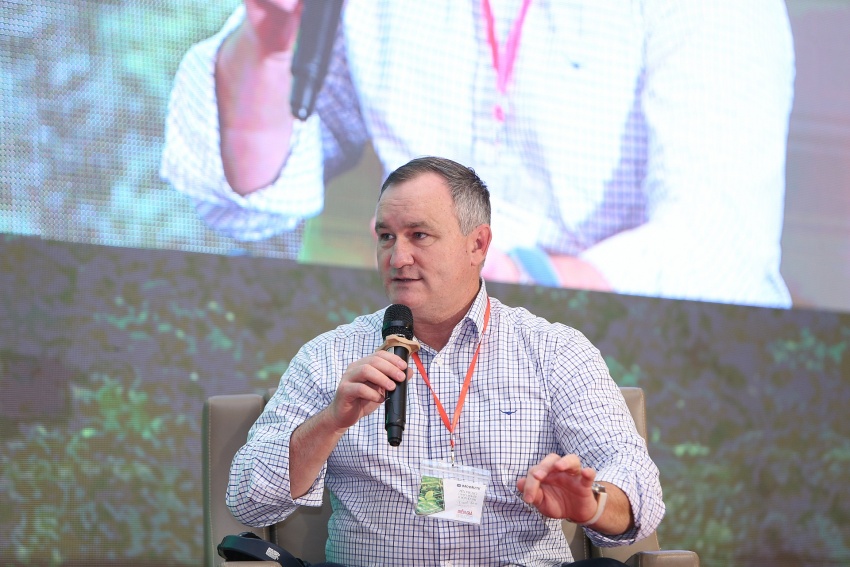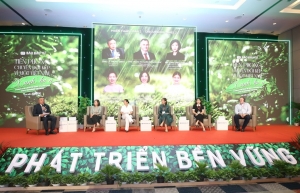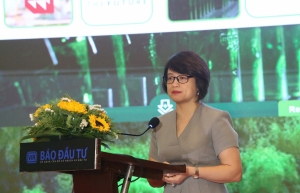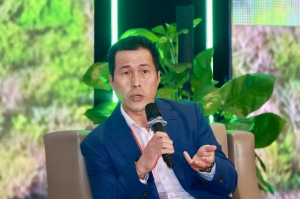Addressing challenges in transition to circular economy
At a sustainable development conference hosted by VIR on November 12 in Hanoi, Craig Richard Bradshaw, CEO of Masan High-Tech Materials (MHT), shared insights on the journey of transitioning to a circular economy model with the goal of sustainable development.
According to Bradshaw, as the world moves towards more sustainable technologies, companies like Masan play a pivotal role in producing materials for electric vehicle batteries, wind turbines, solar panels, and semiconductors – technologies at the heart of the green economy. However, navigating the transition to a circular model has not been without its challenges. “MHT faces a complex set of obstacles in its journey towards a circular economy,” he shared.
On one hand, Masan faces significant pressure from fierce competition, particularly from China, where local companies benefit from extensive government support, including financing and subsidies. This makes it challenging for Vietnamese firms to compete on the global stage. However, there is a silver lining for Masan. The company's products, especially those made in Vietnam, are increasingly favoured by customers, giving its competitive edge over Chinese alternatives in certain markets.
 |
| Craig Richard Bradshaw, CEO of MHT at the VIR's sustainable development conference. Photo: Duc Thanh |
The biggest challenge for MHT lies in the development of its recycling capabilities. Despite making significant strides in developing technology to convert scrap materials into new products, positioning itself as a leader in sustainability, progress has been hindered by slow government approval processes and limited support for building the necessary recycling infrastructure.
“The world is changing rapidly, and to keep up, we need faster decision-making from policymakers,” the CEO of MHT emphasised. “Otherwise, recycling facilities will be built in neighbouring countries like Cambodia, Laos, China, and Malaysia instead of Vietnam. We already have superior technology compared to these operations, so our biggest challenge remains securing timely government support.”
Despite these hurdles, there are signs of improvement. With the recent stabilisation of the Vietnamese government over the past few months, Masan is optimistic that decision-making processes will accelerate, facilitating the implementation of circular economy solutions in Vietnam. The company believes that as policymakers and regulators become more engaged and responsive, the pace of change will pick up, allowing for faster development of necessary infrastructure.
“The key issue Masan faces is the gap between aspirational policies and actionable implementation. While the government has demonstrated strong vision at higher levels, this vision must be translated into tangible actions at local and regulatory levels. For businesses to invest in recycling facilities, new technologies, and sustainable practices like Masan, we need more than just broad goals,” Bradshaw pointed out.
Ultimately, MHT remains committed to its goal of fostering a circular economy in Vietnam. While there are challenges to overcome, the company’s technological edge, combined with an evolving regulatory landscape, provides hope for the future. For the circular economy to thrive in Vietnam, a concerted effort is required from all stakeholders, businesses, government agencies, and the broader community.
 | Green-digital transition must start with proper mindset Firms are emphasising that effectively implementing green-digital transition strategies depends on understanding the core issues and priorities of the company, rather than merely following current trends. |
 | HEINEKEN Vietnam's journey towards net zero HEINEKEN Vietnam, a staple in Vietnam's beverage industry for over 30 years, is reinforcing its commitment to Vietnam’s sustainable development goals. |
 | Dual transition strategy to drive sustainable socioeconomic development At a sustainable development conference organised by VIR on November 12, Truong Bui, partner and general director of Roland Berger Vietnam, a prominent management consulting firm, offered valuable insights on the impact of the dual green-digital transition for businesses. |
What the stars mean:
★ Poor ★ ★ Promising ★★★ Good ★★★★ Very good ★★★★★ Exceptional
Related Contents
Latest News
More News
- Trung Nam-Sideros River consortium wins bid for LNG venture (January 30, 2026 | 11:16)
- Vietnam moves towards market-based fuel management with E10 rollout (January 30, 2026 | 11:10)
- Envision Energy, REE Group partner on 128MW wind projects (January 30, 2026 | 10:58)
- Vingroup consults on carbon credits for electric vehicle charging network (January 28, 2026 | 11:04)
- Bac Ai Pumped Storage Hydropower Plant to enter peak construction phase (January 27, 2026 | 08:00)
- ASEAN could scale up sustainable aviation fuel by 2050 (January 24, 2026 | 10:19)
- 64,000 hectares of sea allocated for offshore wind surveys (January 22, 2026 | 20:23)
- EVN secures financing for Quang Trach II LNG power plant (January 17, 2026 | 15:55)
- PC1 teams up with DENZAI on regional wind projects (January 16, 2026 | 21:18)
- Innovation and ESG practices drive green transition in the digital era (January 16, 2026 | 16:51)

 Tag:
Tag:



















 Mobile Version
Mobile Version